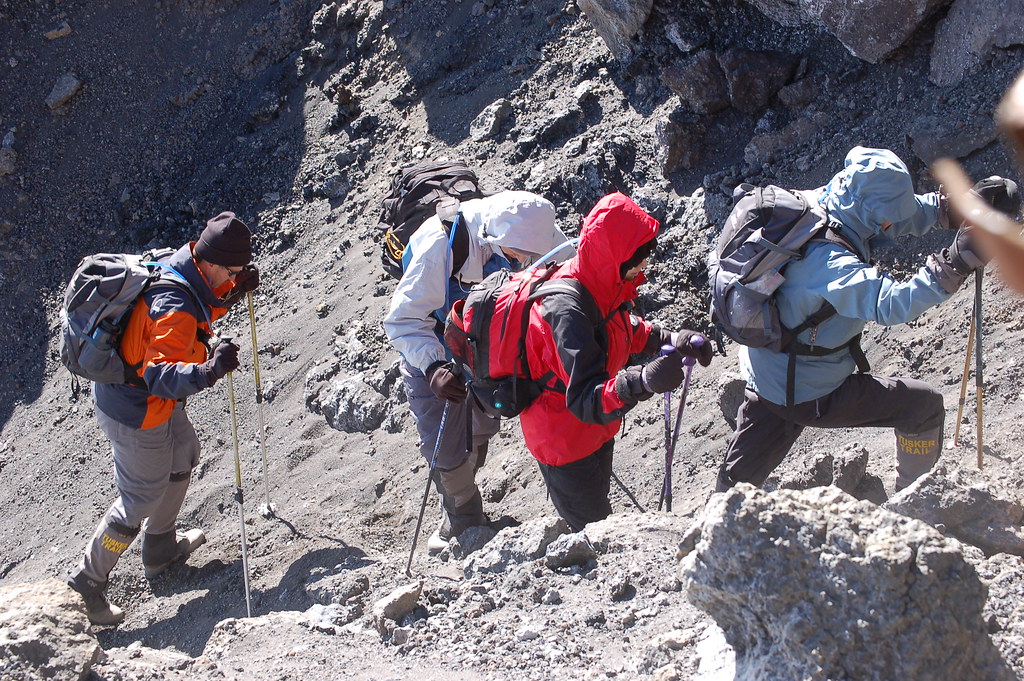Can an Unfit Person Climb Mount Kilimanjaro?

Can an Unfit Person Climb Mount Kilimanjaro? Climbing Kilimanjaro is a strenuous activity that takes place over several days. Therefore, anyone who comes to Tanzania to tackle the mountain should be in the best shape possible.
Like anything else in life, some people set a goal and pursue it wholeheartedly. Others may not feel the same way. While some will participate in extensive training regimens to prepare for their climb, others will barely concern themselves with such matters.
But can someone who is unfit and doesn’t train succeed in reaching the top of Kilimanjaro—the highest free-standing mountain in the world?
The Average Day is Not Difficult
Let’s first talk about what climbing Kilimanjaro encompasses.
Throughout the journey, we hike at a slow, steady pace. A look at any of our trip itineraries will show that the distance covered per day averages around five miles. The time on the trail, including lunch and rest breaks, averages around six hours per day. The result is a leisurely pace of less than one mile per hour on an established trail. Trekking standards would not categorize these days as “strenuous.”
Given these short distances and time frames, it appears certainly possible that an unfit, untrained person could climb Kilimanjaro – at least up until high camp.
The Summit Attempt is Grueling
The summit attempt is a different story. Around midnight, climbers begin their ascent in the darkness. Climbers eat an early dinner and retire in their tents for four or five hours. At an altitude of 15,000 feet, it is difficult to sleep well. So the day begins with most people being excited and sleep-deprived.
The hike to the summit takes 6-8 hours with an elevation gain of 4,000 feet (8-10 hours for slower people). It is almost always cold and windy. After reaching the summit and a joyous celebration, there is a long descent down to 10,000 feet, which takes 4-6 hours normally but can be as long as 10 hours for people who have emptied their tank to get to the top.
As expected, this is an exhausting day, which precisely makes climbing Kilimanjaro a real challenge. Even the most capable bodies put their legs, lungs, joints, and mental strength to the test.
The chances of an unfit person completing this part of the hike fall sharply as physical unpreparedness magnifies these obstacles. But it’s not out of the question for people to will themselves to finish. We have been pleasantly surprised by tough clients many times.
What Role Does Altitude Play?
Let’s consider the effect of altitude. The factor that prevents most people from reaching Uhuru peak is not the physical aspect of the trek itself. It’s the inability to acclimatize to altitude. Furthermore, toughness alone cannot overcome it. If you develop anything more than mild symptoms of acute mountain sickness (AMS), you should not continue climbing.
Our guides monitor every client throughout the hike to ensure they are acclimatizing to the change in elevation. If you have worsening AMS symptoms, our guides will turn you around for your safety. AMS is Mount Kilimanjaro’s top killer, and we won’t risk your health.
AMS can strike anyone. But by being fit, you give your body the best chance to acclimatize. How? Your body expends energy in response to everything it encounters. The act of hiking, carrying a pack, consuming different food and water, sleeping in tents, the changing time zone, the uncertainty of a new activity, etc. are all stressors that can impair the body.
AMS is Mount Kilimanjaro’s top killer, and we won’t risk your health.ost likely to end your climb—the altitude. While some factors, like the weather, are out of your control, preparing your cardiovascular system, muscles, joints and mind for climbing is totally within your control. By being fit, your muscles recover easier from each successive day on the mountain. You also use oxygen more efficiently, which is getting thinner and thinner. Being fit also means you have more confidence in what you can accomplish.
How Fit Do You Have to be to Climb Kilimanjaro?
Unfortunately, there is no definitive answer to this question.
If you can do this, then you can climb Kilimanjaro.” Everyone is different. Some people seem to excel whereas others struggle, with or without training. We tell our clients to put an honest effort into training and show up in the best possible shape. This way, you will know you have done what you could and the rest is up to fate.
A nonchalant attitude about climbing Kilimanjaro can get you into trouble, or worse. Please do not go from sitting in a cubicle for decades to trekking at high altitude on a mountain that claims lives every year. It’s simply careless, irresponsible and disrespectful.
Can an Unfit Person Climb Mount Kilimanjaro? A reasonable degree of fitness is sufficient for climbing Kilimanjaro for most people, provided that they can acclimatize well. We recommend training for at least two months prior to coming to Tanzania. If you are already in hiking shape, great. If you feel your fitness level could use some improvement, please consider beginning your training earlier. Climbing Kilimanjaro has its risks. By being fit, you give yourself the best chance of climbing safely and successfully.

















